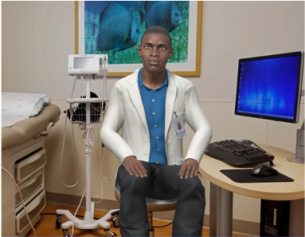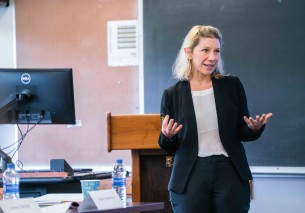
University of Florida College of Journalism and Communications STEM Translational Communication Center Director Janice Krieger is the lead author of “A Pilot Study Examining the Efficacy of Delivering Colorectal Cancer Screening Messages via Virtual Health Assistants” published in the American Journal of Preventive Medicine on April 20. Krieger, Danyell Wilson-Howard,…
Read more
Colorectal cancer (CRC) is the second-leading cause of cancer deaths among men and women in the United States. While mortality rates can be cut in half by simply ensuring that patients adhere to current screening guidelines, many people do not take appropriate steps to educate themselves and take advantage of…
Read more
University of Florida College of Journalism and Communications STEM Translational Communication Center Director Janice Krieger is quoted in “UF Health Virtual Human Intervention Allows for Colorectal Cancer Screening from Home” published on ufhealth.org on Feb. 15. The article focuses on a new virtual health assistant that gives patients who qualify…
Read more
University of Florida College of Journalism and Communications STEM Translational Communication Center Director Janice Krieger is a co-author of “An Electronic Tool to Support Patient-Centered Broad Consent: A Multi-Arm Randomized Clinical Trial in Family Medicine” published in the Annals of Family Medicine on Jan. 11. Krieger, Elizabeth Golembiewski, Arch Mainous,…
Read more
University of Florida College of Journalism and Communications STEM Translational Communication Center Director Janice Krieger is the senior author of “Internet-Based Tailored Virtual Human Health Intervention to Promote Colorectal Cancer Screening: Design Guidelines from Two Users” published in the Journal of Multimodal User Interfaces on Jan. 2. Krieger, Mohan Zalake,…
Read more
Despite efforts to improve colorectal cancer (CRC) screening with a goal of reducing mortality and health outcome disparities, CRC is the third-leading cause of cancer deaths among Black women in the United States. In the interest of increasing early detection of CRC for Black women, University of Florida College of…
Read more
University of Florida STEM Translational Communication Center (STCC) post-doctoral associate Melissa Vilaro and STEM Center Director Janice Krieger are the co-authors of “Tailoring Virtual Human-Delivered Interventions: A Digital Intervention Promoting Colorectal Cancer Screening for Black Women” published in the Journal of Psychological, Social and Behavioral Dimensions of Cancer on Sept.…
Read more
University of Florida STEM Translational Communication Center Director Janice Krieger and a team of researchers have been awarded a $152,492 supplement to the $3.04 million grant from the National Institutes of Health (NIH), which is testing the efficacy of using virtual technology to increase colorectal cancer screening among rural and…
Read more
Minority populations, particularly Black men, have a greater incidence, prevalence, and mortality rate from prostate cancer than other groups. Because of this, communicating pertinent medical information and disseminating materials specific to Black men is critical to combat this trend. University of Florida College of Journalism and Communications Journalism Professor Kim…
Read more
Kim Walsh-Childers, University of Florida College of Journalism and Communication Journalism professor, and Janice Krieger, director, STEM Translational Communication Center, are co-authors of “Development of a Minority Prostate Cancer Research Digest: Communication Strategy Statement for Black Men” published in the Journal of Cancer Education, July 2020. In the study, Walsh-Childers,…
Read more
Eastern and Western medical knowledge can inform each other in the treatment of people in Asia across a wide range of health issues. A new book, Expanding Horizons in Health Communication: An Asian Perspective, brings together health communication scholars from diverse disciplines to present an innovative investigation of Eastern and…
Read more
A new University of Florida transdisciplinary collaboration has been awarded nearly $50,000 to help reduce colorectal cancer screening inequities affecting African-American patients, by optimizing the delivery of a mobile screening intervention. The project, titled A Sociolinguistic-Enabled Web Application to Precision Health Intervention for African Americans, is funded through a $49,004…
Read more